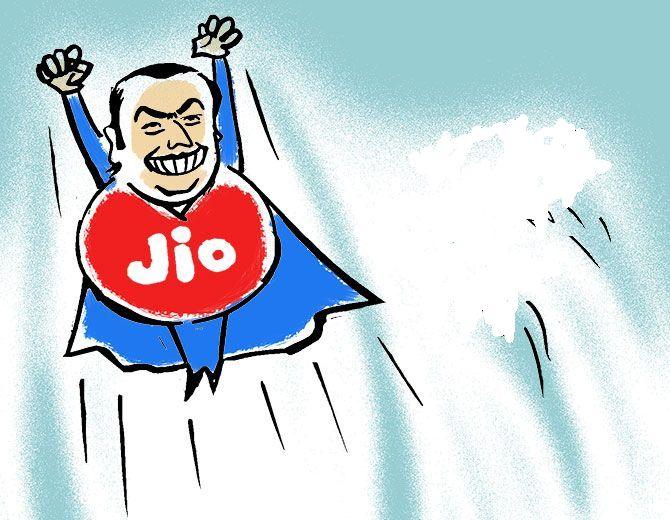FB deal puts RIL on course to be debt-free next year; Reliance Retail biggest gainer from WhatsApp, JioMart arrangement.

Reliance Industries’ (RIL’s) deal with Facebook to sell 9.99 per cent in Jio Platforms has two messages for the oil to telecom major’s shareholders.
The key one is that Jio Platforms is now more valuable than all other businesses of RIL put together, including refining, petrochemicals and retail.
Consider this: Facebook is buying 9.99 per cent stake in Jio Platforms, a 100 per cent subsidiary of RIL, for Rs 43,574 crore. This translates into a market/equity value of Rs 4.36 trillion for Jio Platforms.
RIL’s stock gained over 10 per cent after the deal was announced.
At Wednesday’s price, RIL’s market capitalisation stood at Rs 8.64 trillion.
This means, the other businesses are being valued by the Street at Rs 4.28 trillion.
The other message is that the deal has kick-started the monetisation of digital assets and will help RIL reduce debt, create an incremental revenue stream and could lead to higher valuations for its consumer facing verticals, especially Reliance Retail.
The news of falling leverage levels is positive as it came at a time when its core oil and gas vertical was facing major headwinds because of the collapse of crude oil prices.
This had raised concerns over the completion of the deal with Aramco, wherein the world’s biggest oil producer was looking at picking up 20 per cent stake in RIL’s chemical and refining business in a deal valued at $15 billion.
With the fresh investment from Facebook, leverage concerns have receded.
Of the cash inflow, Jio Platforms is expected to retain Rs 15,000 crore, while the rest will be used by RIL to lower debt by redeeming the optionally convertible preference shares it holds.
This investment, coupled with the Rs 7,000 crore investment by BP in the oil marketing joint venture, is expected to peg back debt by Rs 50,000 crore. RIL had a gross debt over Rs 3 trillion and net debt of Rs 1.53 trillion as of December 2019.
CLSA’s Vikash Kumar Jain and Surajdev Yadav believe that debt could reduce by 20 per cent by the end of June quarter and net debt to Ebitda (earnings before interest, taxes, depreciation, and amortisation) levels should decline from 2.7 times to 2.1 by March 2021 and to half of financial year 2019-20 (FY20) levels by the end of FY22.
RIL has a target of becoming a zero net debt company by March 2021.
Further triggers on the monetisation front will come about when the company is able to close deals related to tower, fibre and Aramco.
Brookfield is slated to pick up a 51 per cent stake in the telecom vertical’s tower assets for Rs 25,215 crore.
The company is also looking at monetising its optical fibre assets that are housed in an infrastructure investment trust.
The key gains from the partnership will come from the commercial arrangement between Reliance Retail, Jio Platforms, and WhatsApp.
This will help create a digital ecosystem powered by JioMart commerce platform, which will enable customers to access kirana stores using WhatsApp.
Analysts at Axis Capital believe it will be a big driver for Reliance Retail, enabling multiple cross-selling opportunities, given the strong presence across offline retail, connect with small businesses/kirana stores, access to wide consumer base (Jio subscribers) and payment gateway (WhatsApp).
If the firm is able to scale up its point of sale machines across smaller retail stores, and the interface between retail stores, JioMart and WhatsApp works seamlessly, there could be a significant upside in terms of revenues for RIL.
Rajiv Sharma at SBICAP Securities believe that Jio Mart/new commerce could generate revenues of Rs 35,000 crore by FY22 with a kirana store network of 1.6 million.
They expect a Rs 200 per share incremental gain for RIL from their offline network of small retailers with gains largely coming from procurement and payments.
The gains are expected to come as the company achieves scale on the retail network, aggregates orders on behalf of smaller retailers and earns a margin on that.
Transactions through payment gateway and a fee for software services used by smaller retailers would be the other sources of revenue.










